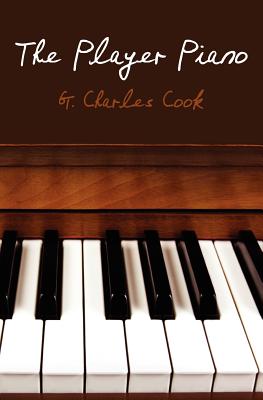
We are introduced in this novel to many characters, large, small, and interesting alike, including “The Wooten Bunch” of Water Wells, Alabama, consisting of six students. Most of the focus is on four particular boys in this bunch as they transition from sixth grade in 1954 through the end of high school in 1961. While The Player Piano at times a coming-of-age story, it’s more than that. This is a tale of the very survival of these boys, with great tension created between their individual actions when forced into situations and whether or not each will survive said choices of action.
Our story takes place in southern Alabama near the Florida border. Sounds, smells, geographical textures, and detailed physical sensations experienced by the characters are vividly portrayed in a variety of settings such as a corn whiskey still in the backwoods, a car speeding along a gravel road, or a rowboat gliding through a swamp. The writing and narrative styles of Mr. Cook lift these characters and settings from what the reader might think will be a simple depiction of rural life in olden times to a level of sheer literary enjoyment, while, at the same time, there is a distinct you-are-there effect.
One absolutely riveting scene, a car chase involving the delivery of some moonshine whiskey, takes place over the course of several chapters, and yet Mr. Cook is not what I would describe as long-winded. In fact, the scene is quietly hilarious, as is a classroom scene early in the novel involving a doomed Show and Tell exercise which also goes on for a few chapters.
The car chase episode also has a small diversion into history, a diversion that begins with the simple sentence, “The town itself was an accident.” This is not off-pace, however. One of the hallmarks of Southern life is that every event is connected to something that started a long, long time ago. Mr. Cook’s approach to flashbacks, as with the story behind the player piano, for example, is to present the past as part of the present.
Of course, tensions and collaborations between people of differing races must be included in a story of such a place and time, and our narrator is someone you can trust to be honest in the telling, but with a light enough touch to let nuanced meanings sink in on their own. There is bittersweet poignancy in some scenes without being overly flowery, wistful understanding at other times without colloquial condescension.
On the whole, use of dialogue balances nicely with background narration, description, and action sequences, with just enough figurative language to keep the reader engaged throughout. I appreciated the use of printer’s marks as I was reading and the paragraphs and chapters seemed to be just the right size. I liked the chapter titles so much that my chief disappointment in this book is that there was no table of contents to flip back to.
Whatever one’s interest level might be toward Alabama history, the shenanigans of high school students, adventures in moonshining and logging, country folk in general, or economic and racial difficulties during the mid-Twentieth century, this novel is an opportunity to relish the old-fashioned experience known as reading a book. Five stars.
About the Author
An author from the Deep South, G. Charles Cook writes of an era between the Old South and the New. A time when the races were holding suspicious hands and looking both forward and backward, a time when unlike personalities were thrown together and rare camaraderie developed. Charles holds a B.A. in economics from the University of Houston and an M.A. degree in literature and writing from the University of South Alabama. Having published essays and short stories elsewhere, this is his first full length novel.
Links
Get an Editorial Review | Get Amazon Sales & Reviews | Get Edited | Get Beta Readers | Enter the SPR Book Awards | Other Marketing Services






















Outstanding review, Lela.
I just sent an LA philosopher/author your way; he’s looking for an organizer and editor for his works prior to self publishing. Yes, he is informed that you are a professional freelance editor/reviewer. OM
Thanks for reading, Ron, and for the recommendation.
I’d like to give the work of the author whose book is reviewed here another nod. In fact, it’s an interesting coincidence that you should comment on this review because I think you would especially enjoy Mr. Cook’s literary style. The locale of this novel is not too far from your digs in Florida and the time period right up your alley.